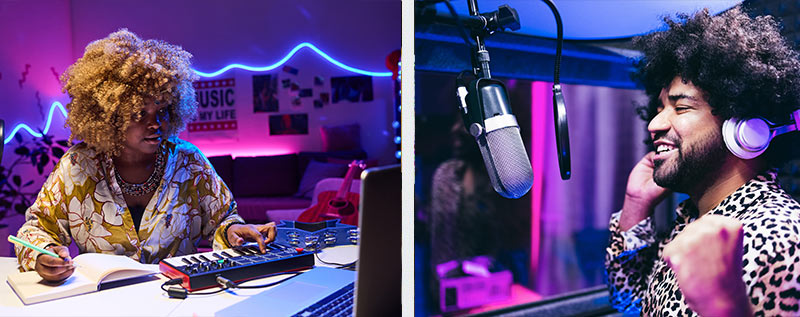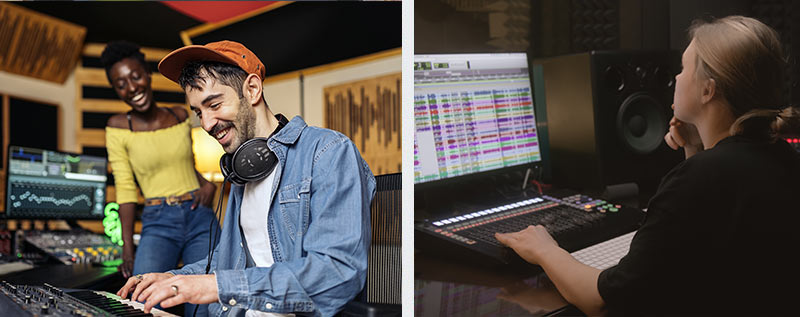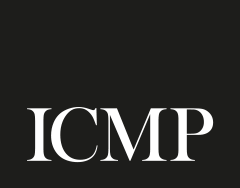Locations
London, Liverpool, Leeds
UCAS code
W3W9
Start date
15th September 2025
Course length
3 Years
COURSE OVERVIEW
If you’re looking to launch a career as a professional writer–producer, the BA (Hons) Songwriting and Production degree will teach you everything you need to know to succeed.
Whether you're a beatmaker with an ever-growing sample library, a multi-instrumentalist backing-track wizard at home in the studio, or a writer–producer looking to co-write and pitch on other artist’s projects, you’ll take your writing and production skills to the next level, with personalised guidance from our expert ICMP songwriting tutors along the way.

During your three years on this industry-aligned course, you’ll cover the entire spectrum of contemporary songwriting from both a practical and theoretical perspective – from melody and topline, and lyrics and concepts, to chords and track. You’ll learn to confidently produce songs for yourself and others, gaining in-the-box production skills across a range of digital audio workstations (DAWs), as well as advanced mixing and recording skills. Many of your classes will be taught in ICMP’s high-tech industry-standard recording studios at our Queen’s Park campus, where you’ll become proficient at using the studio equipment, software and plugins.
During your time with us, you’ll collaborate with talented students on this programme’s ‘sister’ course – the BA (Hons) Songwriting and Artist Development degree – as well as musicians and entrepreneurs across other ICMP disciplines. Each week, you’ll write at least two songs to brief across a wide spectrum of contemporary songwriting genres, styles and approaches – from the melodies of pop and alternative, to the beatmaking of hip-hop, grime and drill. As you progress your creative output, you’ll engage in ‘A&R-style’ feedback sessions and intimate group discussions to critique each other’s work and learn to evaluate your own.
As a writer–producer, you’ll be encouraged to cultivate your own distinctive songwriting style and creative production abilities, with a view to developing and maintaining a successful career in songwriting and producing, whatever that may look like.

At ICMP, our talented tutors all have active careers in both higher education and music, so you’ll develop your craft learning from some of the UK's best songwriters, music producers and musicians. They’ll encourage you to establish a unique music industry career path where you control exactly where, when and how you progress. You’ll also be presented with many exciting opportunities to learn about music entrepreneurship and build your network and career portfolio, such as songwriting-and-production-specific masterclasses and events, visits from industry representatives, and opportunities to perform at ICMP’s Songwriters’ Circle nights.
By the time you graduate ‘career ready’, you’ll have developed a strong understanding of the culture and history of songwriting; expertise in enterprise, business and marketing; and, perhaps most importantly, a creative portfolio of more than 100 songs.
Fees & Funding
Taking a music course at ICMP makes financial sense too, making studying a Songwriting degree at ICMP great value as well as great fun. Student Loans are available to eligible UK students, see our Fees page for further information.
Course Fees: UK Students | EU/EEA/International Students
Programme Specification | Programme Handbook
Click to view the full terms and conditions of applying to study at ICMP.

Successful completion of the BA (Hons) Songwriting and Production course leads to the award of Bachelor of Arts degree by The Institute of Contemporary Music Performance.*
* Please note: ICMP Liverpool and Leeds courses are currently subject to validation.
Experience ICMP in-person
Open Days
Featuring information about this course, the many benefits of studying here, tour our facilities and much more.
You can also join our online event or book a personalised tour.
Key facts
- Created especially for songwriter–producers and beatmakers.
- Discover your creative songwriting voice, with weekly individual and collaborative songwriting and production activities.
- Study a practice-based curriculum of the art and craft of modern songwriting, with a strong focus on melody, topline, lyrics, chords and more.
- Write more than 100 unique songs across a variety of genres and styles.
- Create songs using in-the-box production/DAWs.
- Record in ICMP’s industry-standard music studios.
- Understand how the modern music world operates and develop strong entrepreneurial business practices.
- Showcase your songwriting at top city venues across London.
- Build connections with the wider music industry and establish an exceptional songwriting network.
UCAS CODES
- Course Code: W3W9
- Institution Code: i25
- View course on UCAS

